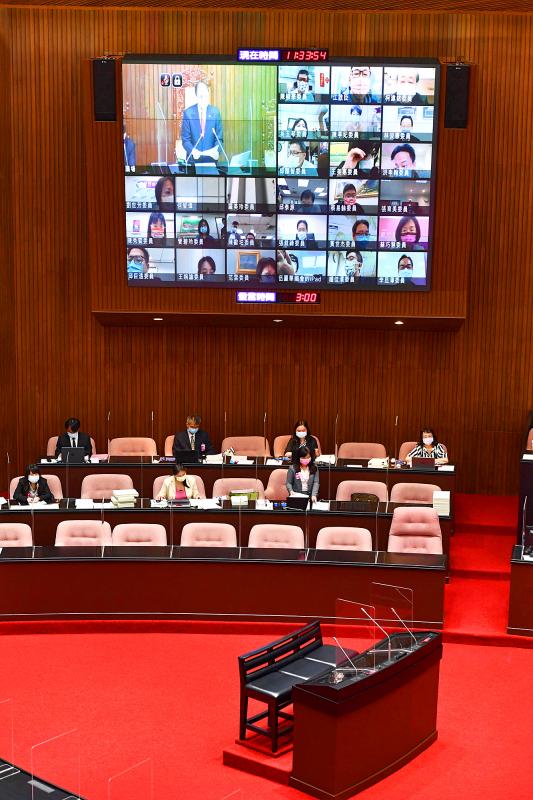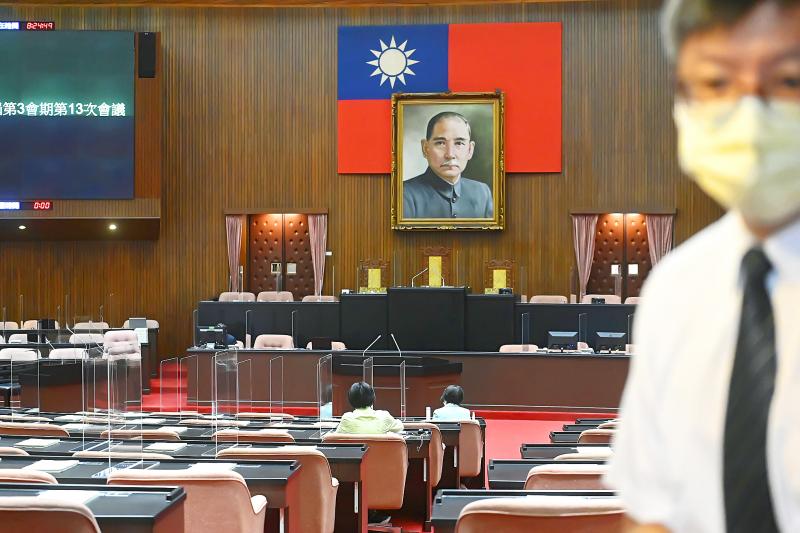Legislators yesterday passed the second reading of draft proposals to boost government spending for industries affected by the COVID-19 pandemic to NT$630 billion (US$22.55 billion).
The proposed amendments to the Special Act for Prevention, Relief and Revitalization Measures for Severe Pneumonia with Novel Pathogens (嚴重特殊傳染性肺炎防治及紓困振興特別條例) next proceed to the final phase of cross-party negotiations.
They are to be considered for a third reading on May 31, the final day of the current legislative session, Legislative Speaker You Si-kun (游錫堃) said.

Photo: CNA
The proposals would raise government spending to NT$630 billion for industries affected by the pandemic, up from the current cap of NT$420 billion, while also extending the spending deadline to June 30 next year. The current bill is set to expire on June 30.
A report accompanying the proposal said that the additional spending and extension were needed to spur economic growth, as more businesses are affected by COVID-19 with a recent increase in local infections.
“The outbreak situation is affecting industries and families, and the public needs relief and economic revitalization to protect people’s livelihoods and maintain social stability,” it said.

Photo: Chen Chih-chu, Taipei Times
Legislators also passed amendments to the Criminal Code to address inconsistencies in punishments for people found guilty of traffic infractions that resulted in injuries and who fled the scene of the incident.
Under the amendment, offenders are to receive jail sentences from six months to five years, while those whose actions resulted in death or serious injuries are to receive prison terms of one to seven years.
Meanwhile, the Legislative Yuan yesterday tested holding sessions through videoconferencing during the morning session, which You said was a “historic” moment.
Although 80 of the 113 legislators have been set up to connect to the videoconferencing system through computers or iPads, only 36 participated in the test.
“It felt OK to operate the system. If the COVID-19 outbreak continues, it would be better to use videoconferencing for our meetings,” Democratic Progressive Party Legislator Wang Mei-hui (王美惠) said.
On Thursday last week, Chinese Nationalist Party (KMT) Legislator Lai Shyh-bao (賴士葆) said that the KMT did not support the idea because of security concerns, adding that electronic devices might contain surveillance programs.
Meetings at the Legislative Yuan have been suspended for a week starting today amid a surge in locally transmitted COVID-19 cases.
The decision was made following interparty negotiations on Thursday afternoon.
Several committee meetings have been canceled since Saturday last week, when the Central Epidemic Command Center raised the COVID-19 alert to for Taipei and New Taipei City to level 3, which has since been applied to the entire nation.
Additional reporting by CNA

Taiwan has received more than US$70 million in royalties as of the end of last year from developing the F-16V jet as countries worldwide purchase or upgrade to this popular model, government and military officials said on Saturday. Taiwan funded the development of the F-16V jet and ended up the sole investor as other countries withdrew from the program. Now the F-16V is increasingly popular and countries must pay Taiwan a percentage in royalties when they purchase new F-16V aircraft or upgrade older F-16 models. The next five years are expected to be the peak for these royalties, with Taiwan potentially earning

POSITIVE DEVELOPMENT: Japan and the US are expected to hold in-depth discussions on Taiwan-related issues during the meeting next month, Japanese sources said The holding of a Japan-US leaders’ meeting ahead of US President Donald Trump’s visit to China is positive news for Taiwan, former Japan-Taiwan Exchange Association representative Hiroyasu Izumi said yesterday. After the Liberal Democratic Party’s landslide victory in Japan’s House of Representatives election, Japanese Prime Minister Sanae Takaichi is scheduled to visit the US next month, where she is to meet with Trump ahead of the US president’s planned visit to China from March 31 to April 2 for a meeting with Chinese President Xi Jinping (習近平). Japan and the US are expected to hold in-depth discussions on Taiwan-related issues during the

‘LIKE-MINDED PARTNER’: Tako van Popta said it would be inappropriate to delay signing the deal with Taiwan because of China, adding he would promote the issue Canadian senators have stressed Taiwan’s importance for international trade and expressed enthusiasm for ensuring the Taiwan-Canada trade cooperation framework agreement is implemented this year. Representative to Canada Harry Tseng (曾厚仁) in an interview with the Central News Agency (CNA) said he was increasingly uneasy about Ottawa’s delays in signing the agreement, especially as Ottawa has warmed toward Beijing. There are “no negotiations left. Not only [is it] initialed, we have three versions of the text ready: English, French and Mandarin,” Tseng said. “That tells you how close we are to the final signature.” Tseng said that he hoped Canadian Prime Minister Mark Carney

STAY IN YOUR LANE: As the US and Israel attack Iran, the ministry has warned China not to overstep by including Taiwanese citizens in its evacuation orders The Ministry of Foreign Affairs (MOFA) yesterday rebuked a statement by China’s embassy in Israel that it would evacuate Taiwanese holders of Chinese travel documents from Israel amid the latter’s escalating conflict with Iran. Tensions have risen across the Middle East in the wake of US and Israeli airstrikes on Iran beginning Saturday. China subsequently issued an evacuation notice for its citizens. In a news release, the Chinese embassy in Israel said holders of “Taiwan compatriot permits (台胞證)” issued to Taiwanese nationals by Chinese authorities for travel to China — could register for evacuation to Egypt. In Taipei, the ministry yesterday said Taiwan